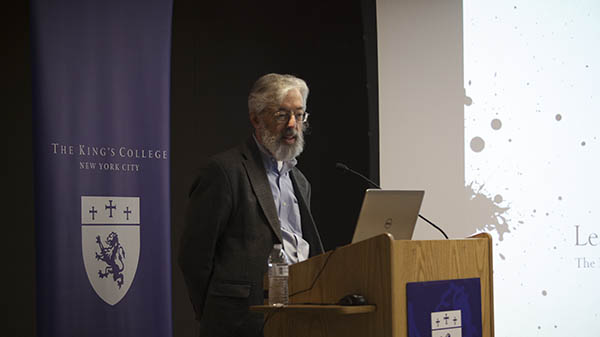Dr. Robert C. Roberts Guides King’s in Developing Humility
Roberts addressed a packed audience in the City Room on “Learning Humility,” and explored questions raised in the talk in a spirited Q&A.

On March 27, The King’s College, along with the Christian Scholars Foundation and the Society of Christian Philosophers, hosted Dr. Robert C. Roberts, Distinguished Professor of Ethics emeritus at Baylor University and Chair in Ethics and Emotion Theory at the Jubilee Centre for Character and Virtues at the University of Birmingham (UK). Roberts addressed a packed audience in the City Room on “Learning Humility,” and explored questions raised in the talk in a spirited Q&A.
Roberts’s talk was part of a three-day visit to The King’s College sponsored through a Christian Scholars Foundation grant awarded to Assistant Professor of Philosophy Dr. Joshua Blander, designed to develop ideas and programs at the College that encourage students and faculty in developing humility and excising pride.
Blander said, “Dr. Roberts is one of the leading philosophers on the topic of humility; and he has done significant empirical research, alongside psychologists, into what types of activities seem most successful in promoting humility. This made him a perfect candidate for getting this conversation started here at King’s.” During his stay at King’s, Roberts also delivered a guest lecture on Abraham Lincoln as an exemplar of humility, led a roundtable for faculty on how to encourage humility in the classroom, and spoke to the Statesmanship Forum on how humility and pride relate to leadership and professional life.
In the Monday lecture, Roberts framed the conversation by noting that the virtue of humility is an ideal, but no sinful human being is perfect in humility. When we aim to acquire humility, we should hope to approach its direction instead of demanding to attain it fully. This knowledge releases us from being paralyzed by fear of our mixed motives underlying even well-intentioned acts.
Roberts defined humility as the absence of the vices of pride, since not all pride is wrong. Pride expressed as self-esteem is fundamental to human development, and it is spiritually healthy to desire to be important to someone, or to God. Pride becomes a vice when it perverts this healthy importance in self-righteousness, vanity, domination, and envy. “Humility is not a lack of concern to be important,” Roberts said. “It is the lack of concern to be important in these pseudo, false ways.”
The humble person cares more about the work than the promotion of self, as Nobel Laureate Barbara McClintock shunned fame because it distracted from her genetic research. John the Baptist was not threatened when Jesus began his ministry, but said instead, “He must increase, but I must decrease” (John 3:30).
Roberts closed with three recommendations for humility education. First, act against the grain of the vices of pride: choose actions that starve your vanity or envy, leaving those desires unsatisfied. Second, think about the vices of pride and their “goods” by noticing and calling out where your actions are motivated by vice. Finally, practice virtues that presuppose humility, such as by keeping a gratitude journal and exercising generosity.
True to the aims of the visit, Roberts’s lecture prompted conversation. During the Q&A, one student wondered how to pursue humility without hubristically overestimating his own power to do so. Another asked Roberts to weigh in on C.S. Lewis’s definition of humility as “not thinking less of oneself, but thinking of oneself less,” to which Roberts argued that humility refers less to lack of self-focus as it does to the quality of your self-focus. Christian practices of self-examination and confession allow for repentant reflection about ourselves. Further questions explored the impact of pride on group identity, the integration of magnanimity and humility, and the foundations for a healthy sense of self-worth. Following the lecture, Roberts continued these inquiries with a group of students over lunch.
Blander said, “A Christian college that values leadership must also value humility. If we produce graduates who want to lead others, then they must be willing to humble themselves in service to others. The venerable Christian tradition of humility is rooted in Jesus’ decision to descend to be with us, and his willingness to suffer great social and personal humiliation. If we want to follow and imitate Jesus, especially as a leader, then that sort of humility is demanded of us, as well.”




